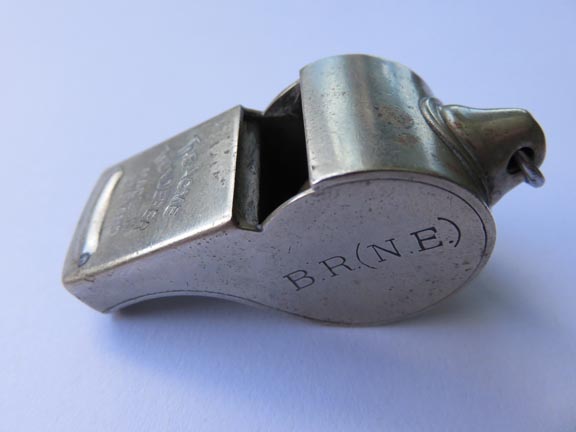Exploding Whistles
 On British Railways the whistle is an important part of the equipment of the platform staff. When I took on as Assistant Station Manager at Reading (Western Region) my boss said to me: “You had better get yourself a whistle – and make sure it is a metal one and not one of those cheap and nasty plastic ones.” I went to the stores and asked for a metal whistle. You might have thought that I had asked for the Crown Jewels. When I explained it was the guvnor’s instructions the clerk grumbled to himself, went out back and, after an inordinate amount of time, returned with a metal whistle. This is one of my prized reminders of an interesting part of my career. I don’t know why my whistle is stamped BR (NE) as the North Eastern Region was a long way away – some things best not to ask. Note that the bowl is bowed in. I will explain why later on. So I went out on the Down side platform with the Inspector and started to get the hang of getting trains away. We would blow our whistles to hurry the passengers into the train then signal to the guard to wave his green flag. Finally we would face front and make sure the driver was aware, using the whistle if necessary, that he was good to go. After an hour or so of this we were sending off a train to Newbury. Now Newbury was where the moneyed gentry lived – people with influence. The Inspector walked up to me and said: “But sir, we don’t blow our whistles at the Newbury trains.” Oh. Really. We do now!” There was always someone who would race through and try and jump on as the train was leaving the station. It was our job to discourage this, by force if necessary. Quite early on I had stopped an intending passenger from getting on a train which was rapidly moving out. He was angry, looked at his watch and said: “You let that train go early.” I showed him my watch which indicated otherwise. He said: “Your watch is fast.” I pointed to the station clock which showed the same time as my watch. “That clock is fast too.” I took him into the office and picked up the phone. The Post Office had a time signal which gave the time in seconds. I dialled TIM (yes it was a real dial phone) and handed the receiver to the irate passenger. He listened, slammed the phone down and said “She’s fast too.” Working the platforms, particularly at night, one always had one’s hands full. With an oil hand lamp in one hand and the platform working book in the other the only place for the whistle was in the palm of the book hand. Now, having started to get the people in the train the next step was to inform the signalmen in the CTC panel that the train was ready to leave. There was a handy large button placed on the wall which, when pressed, set up a light in the CTC panel. With one’s hands full the only way to hit the button was using the bowl of the whistle in the palm of the hand. This worked well for me with my metal whistle but it wasn’t long before I was in the office one evening when an Inspector came in swearing loudly and showing a handful of pieces of plastic whistle. We went through a lot of whistles and irritation but our complaints fell upon deaf ears until one day we reported a train delay of several minutes caused by the platform staff. The reason given was: “Inspector’s whistle exploded.” We then were issued a supply of the metal ones.Ottawa Valley Associated Railroaders The Interchange September 2014 |
